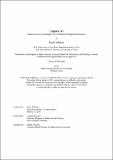Impact.AI: Democratizing AI through K-12 Artificial Intelligence Education
Author(s)
Williams, Randi
DownloadThesis PDF (12.11Mb)
Advisor
Breazeal, Cynthia
Terms of use
Metadata
Show full item recordAbstract
Today's youth are growing up in a world where artificial intelligence (AI) technologies shape how we live, work, play, socialize, and navigate our world. This rapid technological change is already significantly shifting individuals' lives and the opportunities they can obtain. Thus, researchers, educators, and government leaders must consider how to prepare a diverse citizenry to thrive in the emerging age of AI, for example, through outreach initiatives like grade school AI curricula. My thesis delves into K-12 AI literacy, particularly how AI curricula might empower students to see themselves as technosocial change agents, capable of using technology to work toward positive, equitable social change.
First, I explore the question,"What should K-12 youth know about AI?" and introduce a new AI literacy framework, Impact.AI, covering AI concepts, practices, and perspectives that align with a technosocial change agent identity. This framework will inform the development of middle school AI curricula that empower students to become conscious consumers, ethical engineers, and informed advocates of AI. Next, I consider, "How should we design AI curricula for K-12 students and educators?" and share how I iteratively developed AI education tools and curricula that facilitate students' learning about AI as they work on AI projects. Finally, I evaluate how well these frameworks and designed artifacts contributed to students' learning about AI and developing strong AI identities. As AI becomes increasingly prevalent in everyday life, it is essential that all people have the opportunity to both understand and shape the technology.
Date issued
2024-02Department
Program in Media Arts and Sciences (Massachusetts Institute of Technology)Publisher
Massachusetts Institute of Technology